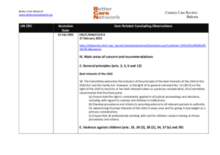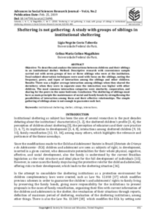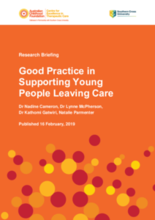Displaying 521 - 530 of 1510
This study investigates staff perspectives on a new form of intensive oversight developed in New York State to prevent maltreatment of youth in care facilities.
This country care review includes the care-related Concluding Observations adopted by the Committee on the Rights of the Child.
To ensure protection of children from institutional abuse, there is an urgent need to review the existing laws in terms of their efficacy to protect children and feasibility in implementation. The present study suggests possible solutions, by trying to understand standardized and effective models of care systems and mechanisms.
The purpose of this paper is to describe and analyze the interactions between children and their siblings in an institutional shelter in Brazil.
This book explores how humanitarian interventions for children in difficult circumstances engage in affective commodification of disadvantaged childhoods.
The aim of this study is to explore whether girls who are in residential care have fewer emotional skills than their peers, and if so, whether these girls have similar socio-emotional skills to girls who also experience disadvantaged environments but live with their families.
This research summary provides an overview of what young people leaving residential care in Australia need and how those working in residential care can best help young people prepare for independence.
The aim of this study was to analyse subjectisuppleve well-being (SWB) among adolescents in care, considering the type of placement in greater depth and how it correlated with several explanatory variables.
The purpose of the study presented in this open access article was to provide an overview of the literature on associations between determinants and social climate and between social climate and outcomes in therapeutic residential youth care (TRC).
This study focuses on life satisfaction among care leavers four years after leaving care in Israel.



